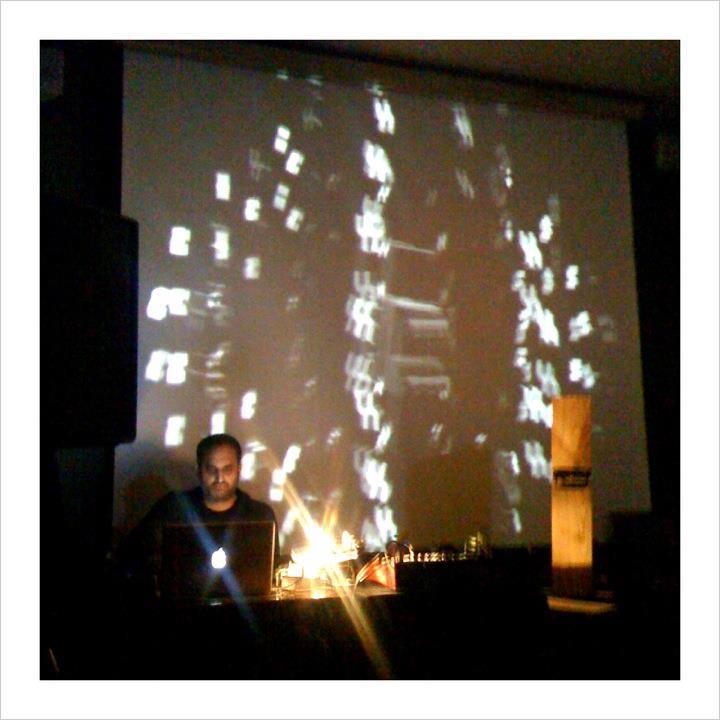As mountain towns go, Asheville is far from the coldest. In January, the city’s most frigid month, the highs hover around 47 degrees, with average lows of about 28. Invest in some sweaters and a few heavy coats, and you’re good to go.
But for Chandra Shukla, who moved to Asheville from San Francisco five years ago, the lower temperatures were a shock. And they had a profound effect on Xambuca, the dizzyingly diverse recording project he revived in 2005 after a decade-long hiatus.
“I grew up in San Francisco, where it’s 70 degrees all the time,” he says with a laugh. “When I came to Asheville, I actually started to experience snow as part of my weather forecast for the first time as a regular thing. It really changed the way that I was doing music. It changed my mood. The idea of going to get an ice scraper was foreign to me. I was wearing parkas and boots and scarves. I started to feel a kinship with the people of the Northern Hemisphere. I started to really identify with what it’s like to live in a cold environment.”
His newfound feeling of cold spurred a sudden interest in the cultures that occupy the world’s frozen corners. He began researching the Saami people, who have occupied the northernmost parts of Scandinavia for at least 5,000 years. That pursuit led him to discover the history of Japan’s Ainu and Iceland’s Inuit cultures as well. Spurred by warming weather patterns, Shukla determined he should pay tribute to these resilient cultures while their intensely cold stomping grounds were still intact. The result is a trio of concept albums, each of which focuses on one of the peoples he studied.
Bathed in icy drones and inhuman chimes, Joulupukki balances archaic cold with technological uncertainty in its attempt to understand the Saami. Released last October, カムィ (pronounced “Kamuy”) moves with dark and delicate synth lines not far removed from a John Carpenter soundtrack as it keys on the struggles of the Aniu. The last release in the series, það var eyja, þetta er hafið, arrives later this year. Its slowly undulating tones are inspired by the Inuits.
On each album, Shukla imagines what a musician from these ancient cultures would create if confronted with modern instruments. The result is otherworldly electronica that powerfully embodies the extreme cold that these cultures have endured. “The cold allows you to feel this connection with other places that are cold somehow,” he explains. “I think that was kind of the gateway into coming up with this trilogy.”
These albums have been a somewhat solitary pursuit, but Xambuca finds Shukla working with an enormous cast of collaborators. He’s been out in the Bay Area for the past few weeks doing duo shows with his old friend RK Faulhaber, who helped him out during the project’s initial run. Since moving to Asheville, he’s worked with such talented locals as David James Lynch — who wields his bass with the ominously refined Judas Horse — sometimes expanding his ensemble into the teens.
But the most impactful collaborator he’s picked up since moving to Asheville has been Jason Scott Furr. The keen visual artist has become the group’s go-to VJ, gracing Xambuca’s ever-shifting performances with equally adaptable videos.
For Shukla, who also has a background in graphic design, these visuals aren’t just garnishes. He sees Xambuca as a full-on A/V experience. In the future, he hopes to abandon audio-only releases altogether, instead producing DVDs and other media that highlight the project’s multiple facets.
“We’re really in the age of experiencing multimedia events,” Shukla says. “I mean, anytime you go to a big stadium, there’s visuals and video displays and screenings. We’re at the brink of the two being indistinguishable. It’s kind of one solitary movement. I really want that to be the focus of what we are. I don’t want it to be audio, and I don’t want it to be video. I want it to be a marriage of the two, a solid and powerful artistic expression in one single form that the audience experiences.”
For now, Xambuca is Shukla’s primary occupation. He was laid off from his computer engineering post at Durham’s Research Triangle Park in 2011, freeing him from his desk, as well as his four-hour commute. Paying the bills has been difficult, but Shukla couldn’t be happier.
“I really strongly believe that if you keep doing it, then people will recognize the importance,” he says. “I look at it as a long-term investment.”




Before you comment
The comments section is here to provide a platform for civil dialogue on the issues we face together as a local community. Xpress is committed to offering this platform for all voices, but when the tone of the discussion gets nasty or strays off topic, we believe many people choose not to participate. Xpress editors are determined to moderate comments to ensure a constructive interchange is maintained. All comments judged not to be in keeping with the spirit of civil discourse will be removed and repeat violators will be banned. See here for our terms of service. Thank you for being part of this effort to promote respectful discussion.